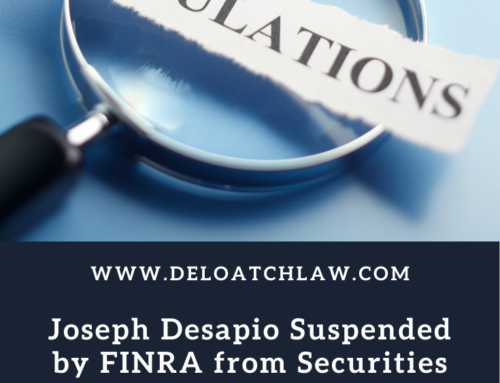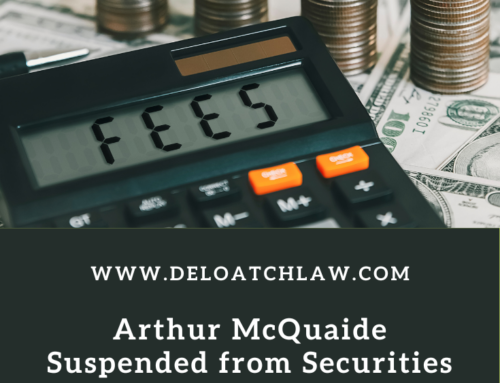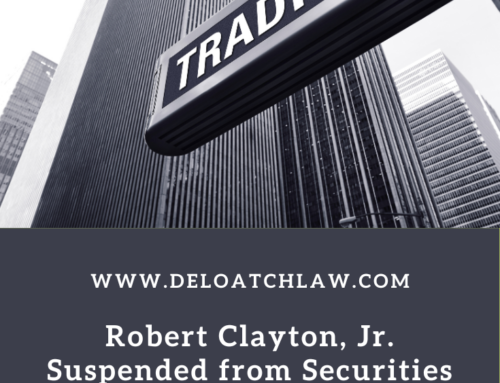 Have you purchased and lost money in securities sold through a private placement offering? Did you purchase the securities based upon a recommendation of a broker, just to later find out they are something other than what the broker described or what you actually wanted? Do you only have a vague understanding of what you purchased? If you answered yes to any of these questions, these securities may not be suitable for you.
Have you purchased and lost money in securities sold through a private placement offering? Did you purchase the securities based upon a recommendation of a broker, just to later find out they are something other than what the broker described or what you actually wanted? Do you only have a vague understanding of what you purchased? If you answered yes to any of these questions, these securities may not be suitable for you.
Although securities sold through a private placement are being offered for the first time, they are not the same as securities being sold through an initial public offering (IPO). In fact, private placement securities are almost the opposite of an IPO.
Unlike an IPO which involves the sale of registered securities to the general public, a private placement offering sells unregistered securities to a very specific category of investor, rather than the general public. What’s the difference?
Registered vs Unregistered
Both IPO’s and private placements are regulated by the Securities & Exchange Commission (SEC) and the Securities Act of 1933 (the Act), but they are governed by different sections. Specifically, private placement offerings are sold pursuant to Regulation D (Reg. D) of the Act.
Without going into too much detail, when securities are sold in an IPO, the issuer is required to register the securities with the SEC. Part of the registration process requires issuers to make specific types of disclosures regarding the risks inherent in the company. These disclosures are compiled in a risk disclosure document (i.e. a prospectus) that are required to be given to the purchaser to inform them of the material risks inherent in the securities.
When securities are sold in a private placement, the SEC does not require the securities to be registered. However, the SEC still requires the issuer to make certain disclosures in a document for potential investors – the private placement memorandum (PPM). Unlike the disclosures made in a prospectus, the disclosures in a PPM are not as expansive, because the intended investor is presumed to be more sophisticated and better equipped to evaluate and withstand the risks associated with the securities.
What exactly is the presumed greater level of sophistication based on?
Class of Investors
For purposes of determining who these types of securities are suitable for, Reg. D distinguishes between accredited and non-accredited investors. Generally, private placement securities are presumed to be suitable for accredited investors and not non-accredited investors. However, there are specific limited exceptions that allow for sales to non-accredited investors.
Reg. D has a very specific definition of an accredited investor, as it applies to people:
- Someone having a net-worth of over $1,000,000.00 at the time the investment is being made; or
- Someone having an annual income of over $200,000.00 for at least the most recent 2 years.
For a married couple, the definition is slightly different:
- Having a net-worth of over $1,000,000.00 at the time the investment is being made; or
- Having an annual income of over $300,000.00 for at least the most recent 2 years.
In 2016, the definition of an accredited investor was modified to include registered brokers and investment advisors. Also, if a person can demonstrate sufficient education or job experience showing their professional knowledge of unregistered securities, they too can qualify to be considered an accredited investor.
Suitability
The main reason for the limitations on private placement securities is the amount of risk inherent in them. Thus, making them unsuitable for many investors.
As previously indicated, the risk disclosures made by issuers of private placement securities are considerably less comprehensive than those made by issuers of securities sold to the general public. Because of this lack of disclosure, typically someone without a business, financial and/or legal background are not able to properly assess the risks associated with such securities. Additionally, the fact that the securities cannot be sold to the general public, because of their lack of registration, they in turn cannot readily be resold by the initial purchaser. Consequently, the securities are not as liquid as registered securities, which can be resold in the aftermarket on whatever exchange they trade. In short, purchasers of private placement securities may be stuck holding a security they no longer want while the price declines significantly.
This double layer of risk – limited disclosure and illiquidity – can cause an investor to lose a substantial portion, if not all of their investment very quickly, depending on economic and market factors.
Because of these risks, private placement securities are generally unsuitable for the typical investor who doesn’t meet the definition of an accredited investor.
Broker Responsibility
In addition to making a good faith effort to determine whether the purchaser of private placement securities meets the definition of an accredited investor under Reg. D, brokers and broker-dealers have to ensure they follow the general suitability requirements under FINRA Rule 2111. Despite these obligations of brokers and broker-dealers, private placement securities quite often are the subject of customer initiated suits and arbitrations. Although the risks associated with these securities makes them unsuitable for the average investor, it is not uncommon for these securities to be sold to the average investor, despite the obligations imposed on brokers and broker-dealers. The most common issues surrounding these disputes are:
- negligence – sometimes brokers and broker-dealers don’t always properly asses the investor’s risk tolerance;
- suitability – despite having properly assessed an investor’s suitability, the broker still inappropriately recommends the investment;
- misrepresentation – the broker down plays the level of risk while overstating the potential returns; and
- conflicts of interest – they have a financial incentive in the form of fees from the issuer to sell the security, that they place above their suitability obligations to their clients.
The unfortunate reality is that not all brokers and broker-dealers are going to do what they’re required to do.
Best Practices As an Investor
As an investor, it is always a good idea to review your account holdings and suitability information to determine the appropriateness and legitimacy of your portfolio holdings. Indeed, this is the first step in determining whether you were the victim of an unscrupulous broker. If you believe you may have been, your next step should be to seek the advice of an experienced legal professional.
The Law Office of Kevin J. Deloatch, Esq. has an extensive securities law practice and over 30 years of experience on Wall Street. If you would like a free consultation, call today at (646) 792-2156. If there is a basis for filing a claim your time may be limited. Call today to avoid delay.








